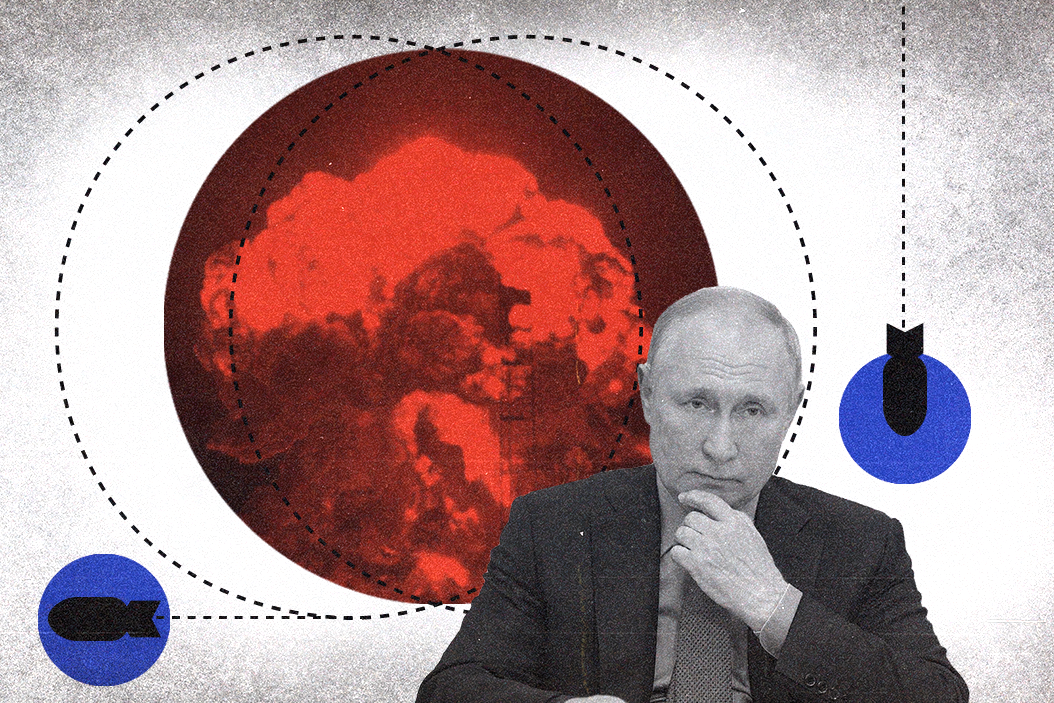Vladimir Putin isn't exactly losing the war in Ukraine, but he's definitely not winning it either.
Although Russia has more territory now than before the invasion, things aren't going well. Putin has had to call up reservists, his annexation of four Ukrainian regions was immediately challenged, and he's on the hook now for selling to the Russian people the idea that they are at war with NATO and the West.
Putin's push to win at all costs might soon force him to make one very serious and potentially scary choice. He needs to land a big blow, so what bigger blow than the biggest of them all: nuclear weapons. Russia's president has already hinted at the possibility, while Washington and NATO are sorting through what they might do in response.
Let's look at why he might, or might not, pull the trigger to launch what is known as a tactical nuke, a low-yield atomic warhead designed to take out military targets, not entire cities.
The sheer destructive capacity of a nuclear weapon could turn the tide of the war in Russia’s favor. Even a small nuclear strike could wipe out entire units of Ukraine's army in minutes. It would also give the Russians time to regroup their forces to push back against the ongoing Ukrainian counteroffensive and appease hardliners griping about Russia not doing enough to win in Ukraine.
Putin still has some other options. He could order cyberattacks, the sabotage of European energy links, or more intense conventional strikes on Ukrainian cities and infrastructure. But none of those have the shock value of a single nuke, which might just scare Kyiv into accepting Russia’s terms for “peace” — such as the recent land grab of 15% of Ukraine.
Also, Putin perhaps thinks he can get away with it (relatively) unscathed. In other words, the US and NATO will respond, but probably not in kind.
Aside from warning of somewhat vague "catastrophic consequences," the West hasn't been very clear on what it would do if Putin pushed the nuclear button. Doing nothing at all is a non-starter, yet the US and its NATO allies, wary of a dangerous escalation with nuclear-armed Russia, might only toughen sanctions and send more advanced weapons to Ukraine — a best-case scenario for Putin.
Putin might even test a tactical nuke just to bait NATO into attacking Russia, which he's been daring the alliance to do since his invasion began. It would give him an excuse to say he was right all along about the West trying to encroach on Russia’s sphere of influence.
Still, for Russia, a non-nuclear Western response might be almost as bad as a nuclear one. US airstrikes could wipe out most of Russia's forces inside Ukraine and sink its entire Black Sea fleet in one fell swoop. Putin might back down if he thinks the price would be too high — even if it went against his own grievance-fueled narrative.
Dangerous escalation? Perhaps. But it hasn’t been ruled out by retired senior US officials.
Putin might lose his two most powerful friends if he pushes the button. Although we know both China’s Xi Jinping and India’s Narendra Modi are unhappy about how the war is going, we don't know what they recently told Putin about how they’d react to a Russian nuclear strike. But Putin does, and his decision-making will surely factor in how it'll go down in Beijing and New Delhi.
The Chinese or Indian response could be anything from a reprimand at the UN to cutting economic ties with Moscow right when the Russian economy is reeling from sanctions despite a strong ruble. Just the threat of turning down Russian oil and natural gas — which Putin needs to sell to keep his war machine going — should give the Russian leader pause.
There's no turning back. If Putin crosses that line, all other options cease to exist. He loses control of the narrative because he's done the unthinkable. Then again, perhaps the Russian leader has already backed himself into a corner, and it's all just a question of not if but when he orders the first nuclear strike since World War II.
What do you think Putin will do? Let us know here.This article comes to you from the Signal newsletter team of GZERO Media. Sign up today.
- How close are we to a 2nd Cuban Missile Crisis? - GZERO Media ›
- How close are we to a second Cuban Missile Crisis? - GZERO Media ›
- Russian attacks on Ukraine are state-sponsored terrorism ›
- GZERO Exclusive: Ian Bremmer: Risk of nuclear crisis in 2022 is too high - GZERO Media ›
- Ian Bremmer: US support for Ukraine vs fear of Russian escalation - GZERO Media ›
- Zaporizhzhia nuclear plant at risk of disaster, says top nuclear watchdog - GZERO Media ›
- Russia-US nuclear war is no fantasy, says Kremlin ally - GZERO Media ›
